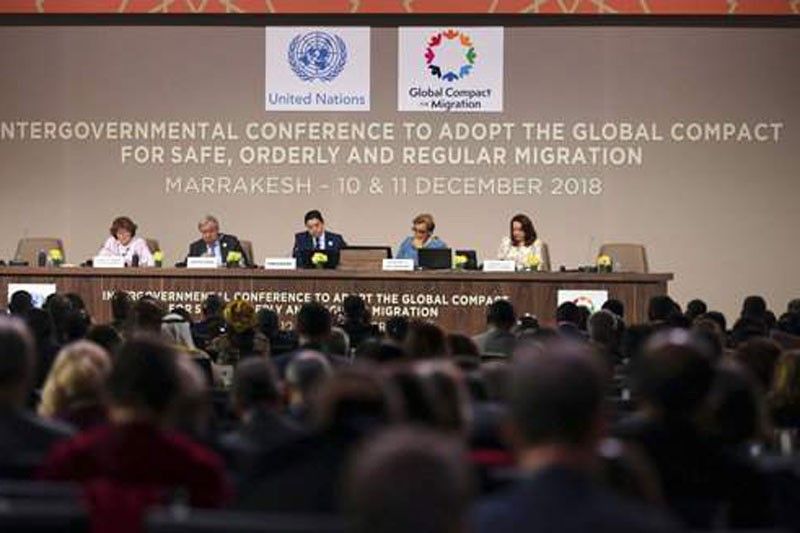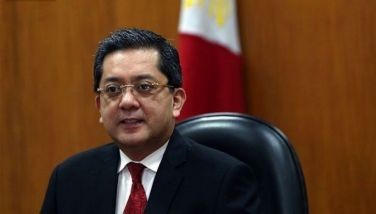Philippines adopts UN Global Compact for Migration

MANILA, Philippines — The Philippines joined 163 countries in adopting the United Nations Global Compact for Migration, now known as the Marrakech Compact, to set in place a voluntary international framework that will manage migration and provide decent treatment for millions of migrants worldwide.
The landmark Global Compact for Migration was adopted on Monday by leading representatives from 164 governments at an international conference in Marrakesh, Morocco that will help prevent suffering and chaos of migrants.
The adoption of the compact coincided with the 70th anniversary of the Universal Declaration of Human Rights, a document that is central to the pact.
The Philippines supported the first migration deal, given the needs of the estimated 10 million Filipinos residing or working in almost all countries of the world.
The document, though non-binding, will set in place a voluntary international framework that will manage migration in an acceptable and implementable manner by all states.
The Philippines lauded 163 governments for the adoption of the first migration deal that paves the way for managed and safer migration for all.
“Thank you for adopting the Global Compact of Decency for Migrants. Our fears are allayed. Our hopes are raised,” said Foreign Affairs Secretary Teodoro Locsin Jr. at the Intergovernmental Conference to adopt a Global Compact for Safe, Orderly and Regular Migration.
He said that the adoption of the Philippine-backed Global Compact for Safe, Orderly and Regular Migration (GCM) defeated the notion that migration is bad by showing that migrants have been useful additions to host countries.
“These are days of fear, fury and confusion. Some of our friends in today’s endeavor have withdrawn under pressure from their constituencies. And they must indeed respond to them for we are democracies,” Locsin said.
The Philippines, he said, was not discouraged as the GCM enjoys near universal support and those not yet ready to commit recognize the clear need to discuss migration.
“We have defeated the notion that migration is bad; quite the opposite. And we did this with facts and not frightful fantasies of losses of jobs no Westerner would take. We did it with reason by showing that migrants have been useful additions to host countries,” Locsin added.
“Not fear but facts shaped our perception; reason not passion distinguished discussion at the UN if nowhere else, and we should be proud to acknowledge that a decent regard for the opinion of mankind dictated our decision to adopt the Global Compact today,” he said.
German Chancellor Angela Merkel welcomed the adoption, saying that it was high time the international community came to a more realistic understanding of global migration.
Merkel warned the people that the “go it alone approach will not solve the issue,” stressing that multilateralism is the only possible way forward.
The Philippines actively participated in the negotiations for a Global Compact for Safe, Orderly and Regular Migration given the needs of overseas Filipino workers.
Along with climate change, unregulated migration has become a pressing issue in recent years. Every year, thousands of migrants lose their lives or go missing on perilous routes, often falling victim to smugglers and traffickers.
UN senior migration official Louise Arbour, tasked with overseeing the process, applauded the adoption, calling it a “wonderful occasion, really a historic moment and a really great achievement for multilateralism.”
She congratulated member-states for working “very hard to resolve differences, to understand the complexities of all questions related to human mobility for the last 18 months.”
Arbour, the UN Special Representative for International Migration, said the compact will make an enormous positive impact in the lives of millions of people – migrants themselves, the people they leave behind and the communities that will then host them. She revealed that this will depend on the implementation of the global compact’s initiatives.
Representing civil society and youth at the conference opening, children right’s activist Cheryl Perera spoke of her volunteer work against child trafficking. She urged the delegates to make full use of the opportunity the Global Compact for Migration provides.
“The GCM offers a historic opportunity now for you to deliver on your existing obligations to protect children and invest in young people all around the world. But it doesn’t end here. You need to address the underlying risks of forced and unsafe migration, like climate change, social political exclusion, disasters and inequality, and you need once and for all to end immigration detention,” she said, adding that everyone needed to do more “to prevent trafficking and protect victims.”
“You need to stop criminalizing migrants,” she added.
UN Secretary-General António Guterres said the compact provides a platform for humane, sensible, mutually beneficial action resting on two simple ideas.
“Firstly, that migration has always been with us, but should be managed and safe; second, that national policies are far more likely to succeed with international cooperation.”
The UN chief said that in recent months there had been “many falsehoods” uttered about the agreement and the issue of migration.
In order to dispel the “myths,” he said that the Compact did not allow the UN to impose migration policies on member-states, and neither was the pact a formal treaty.
Acknowledging that some states decided not to take part in the conference or adopt the compact, Guterres expressed hope that they would come to recognize its value for their societies and join in “this common venture.”
The United States did not endorse the compact, and more than a dozen other countries either chose not to sign the accord or are still undecided.
The UN welcomed the overwhelming global support for the pact, saying that for people on the move, “voluntary or forced; and whether or not they have been able to obtain formal authorization for movement, all human beings must have their human rights respected and their dignity upheld.”
UN data show that globally, more than 60,000 migrants have died on the move since the year 2000, prompting the Secretary-General to call it “a source of collective shame.”
Former UN president of the General Assembly, Slovak foreign minister Miroslav Lajcak, said the Global Compact for migration “will formally become the first comprehensive framework on migration the world has ever seen.”
The compact was approved in July by all 193 UN member-states except the United States, which backed out last year.
- Latest
- Trending



























